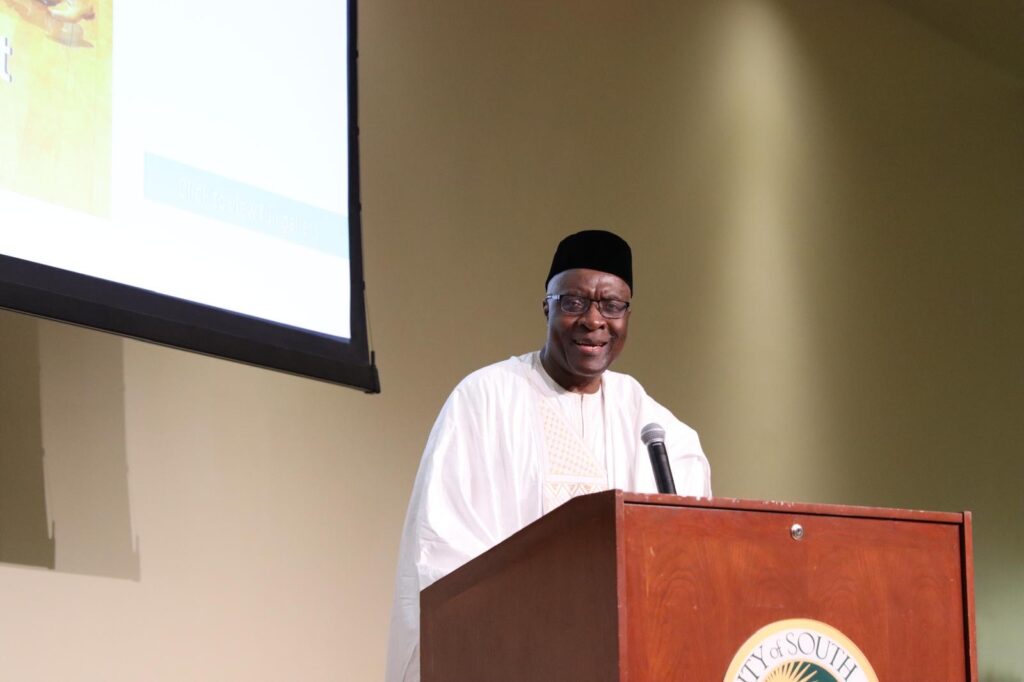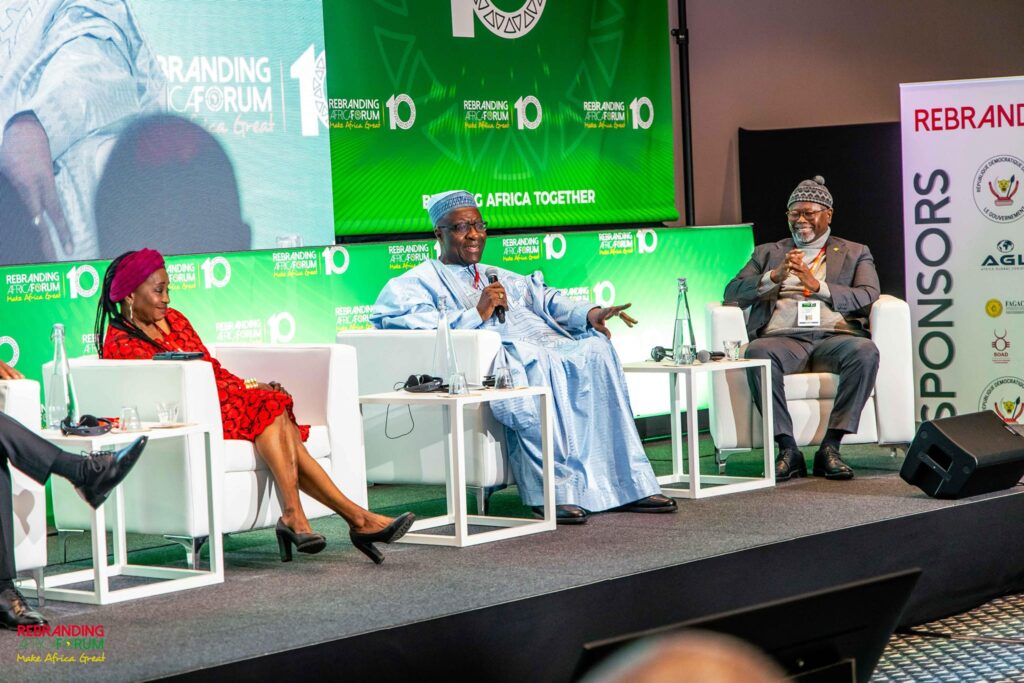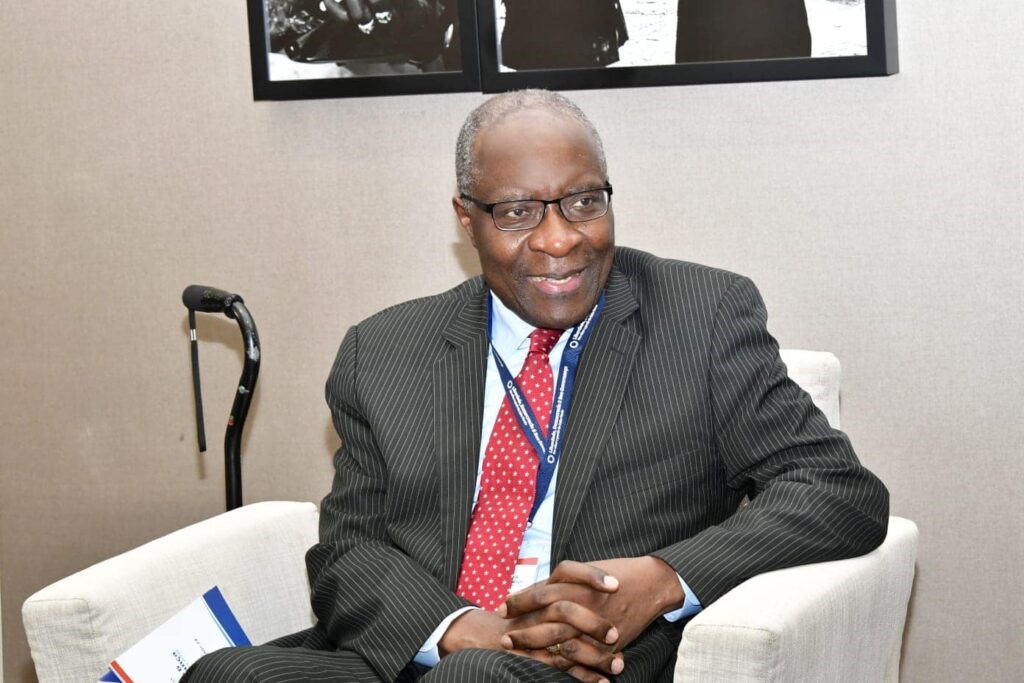|
Cameroon Needs a Leader to Unite and Reform, Says Dr
Fomunyoh
"The three R's - reform, reconciliation and rebuilding - must guide the next
leader," Fomunyoh asserted, underscoring the urgency of addressing
systematic issues that have persisted for decades
By Boris Esono Nwenfor
 Reform, reconciliation, and
rebuilding must guide the next leadership of Cameroon, says Dr
Fomunyoh
Reform, reconciliation, and
rebuilding must guide the next leadership of Cameroon, says Dr
Fomunyoh
Dr Christopher Fomunyoh Senior Associate for Africa, Regional Director and
Special Adviser to the President at the National Democratic Institute, NDI, a
figure recognized for his contributions to international and African
development, has advocated for a generational shift in leadership, post the Biya
era.
Speaking in an interview with Dash TV, Fomunyoh was asked on the multiple calls
that have been ongoing for President Biya to seek reelection, at a time when the
country faces major crises.
"We all know that with the challenges that Cameroon faces today, the country
needs a leader who would be awake and hardworking on 24-hour, seven-days-a-week
basis. But if the party (CPDM, a party headed by President Biya) makes its
choice, that will be their choice and I think they will be prepared to live with
the consequences," Fomunyoh said.
With more than four decades in power and now past the age of 90, President Biya
remains at the centre of Cameroon's political discourse. Calls from his ruling
Cameroon Peoples Democratic Movement, CPDM and allied groups have been rife,
calling on him to stand for the 2025 Presidential election.
Biya's supporters argue that his leadership has provided the stability needed to
navigate the complex political and economic challenges that the country has
faced over the years. To them, his potential candidacy is a continuation of his
legacy, citing his long stay as evidence of his ability to lead.
Critics, however, see it differently. They say calls for Biya to seek reelection
is a glaring indictment of Cameroon's political stagnation and a refusal to
embrace generational change.
Cameroon's struggles are well-documented. From the security threats posed by the
Boko Haram insurgency in the Far North to the ongoing separatist fight in the
North West and South West Regions, Christopher Fomunyoh noted that Cameroon
faces challenges that demand active and visionary leadership. The economic
growth in the country also remains stunted and infrastructure projects have
lagged behind expectations.
Will Fomunyoh Stand If Called Upon?
Some political parties, civil society organizations and even press organs have
fancied Fomunyoh to be Cameroon's next president. "I'm humbled by the thought,"
Dr Fomunyoh said in response to speculation about his candidacy. "But this is
not about one person, it is about addressing the fundamental challenges facing
Cameroon today."
 Cameroon needs a leader who would be awake and hardworking on a 24-hour, seven-days-a-week basis,
Cameroon needs a leader who would be awake and hardworking on a 24-hour, seven-days-a-week basis,
says Dr Fomunyoh.
"I'm humbled by that thought and it could be flattery, but I want to thank them
and I hope that it's sincere on their part. I can imagine from some of the
messages that I get from fellow compatriots that they realize the challenges
that the country faces. They realize that the democratic process in the country
is broken, that the security situation in the extreme north with Boko Haram
requires vigorous action, and that the crisis or conflict in the South West and
North West regions of the country warrants maximum attention and resolution.
Fomunyoh added: "They look at some of the things that I do around the world or
across Africa and have an appreciation that were I to join efforts with other
compatriots that we could lift our country into a better place than it is today.
However, I think the subject matter is still premature, and the alignment isn't
quite there but I feel honoured that some of my compatriots think along those
lines. There are multiple ways in which I could continue to contribute to lift
our country from the current situation in which it finds itself."
Fomunyoh's Ideal Leader For Post-Biya
While many Cameroonians have expressed diverse opinions about the qualities
needed in the country's next leader, Dr Fomunyoh hinges his opinion on the three
R's - reform, reconciliation and rebuilding, which to him must guide the next
leader, underscoring the urgency of addressing systematic issues that have
persisted for decades.
He said: "The country needs a strong visionary leader who can undertake massive
reforms of the multiple sectors that are currently broken and that are in
disrepair across the country. We need a leader who can reconcile, who can
embrace national reconciliation as a national priority, just given the excessive
polarization that we see in Cameroon, the excessive fragmentation that we see,
the disaffection between even citizens and the state, the lack of functionality
of various state institutions, that reconciliation is going to be a top
priority."
 Imperative that we sit around
the table and deal with the root causes of the crisis in the English
speaking regions of Cameroon, says Dr Fomunyoh
Imperative that we sit around
the table and deal with the root causes of the crisis in the English
speaking regions of Cameroon, says Dr Fomunyoh
"You need a leader who can rebuild, who can rebuild our communities, our regions,
and who can rebuild the country, who can lift it, not just at the level of where
it was even 10, 20 years ago, but lift it to be a leading nation on the African
continent and a major actor on the global stage. And I would say that a leader
who can meet these three criteria would be my preferred choice for the next
president of Cameroon."
The lingering Anglophone crisis
Now in its eighth year, the Anglophone crisis remains one of Cameroon's most
pressing challenges. The conflict in the North West and South West Regions has
resulted in tens of thousands of deaths, over 800,000 internally displaced
persons, and 100,000 refugees in neighbouring Nigeria. Villages have been razed,
and the socio-economic fabric of the affected regions affected.
"It's very sad because eight years ago in 2017, in 2018, I was out there with
many others. Many of us were out there saying force is not the way to go, saying
dialogue negotiations should happen, saying the grievances are legitimate and
are real and should be dealt with in a very honest, honest manner,"" Fomunyoh
said. "And that the root causes of these grievances should be looked into. And
of course, fast forward to today, we've lost tens of thousands of lives,
innocent lives of citizens and of people in uniform."
"I still feel that until we sit around the table and deal with the root causes,
until we bring into the room the people who have been the most aggrieved and
most impacted by this conflict, until we give them a voice to speak for
themselves and say precisely what it is they want, we're not going to be able to
resolve this crisis. And I will just say today, honestly, as I said five, seven,
eight years ago, that no government in the world has ever benefited from a
frozen conflict with its citizenry. We should not assume that even if the guns
stopped firing, the conflict would have been resolved."
For Cameroonians, the upcoming months are expected to be a time for reflection
and decision-making. It is still uncertain if President Biya will seek
reelection, but all indication points to him doing so in due time. Whether he
runs again or passes the baton to a new leader, the hope is that the next
administration will address the country's pressing challenges and usher in an
era of renewal and progress.
|

